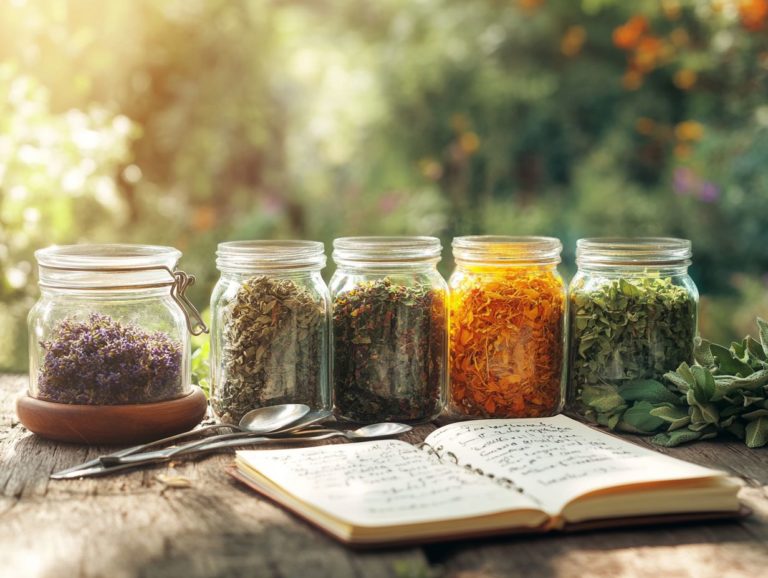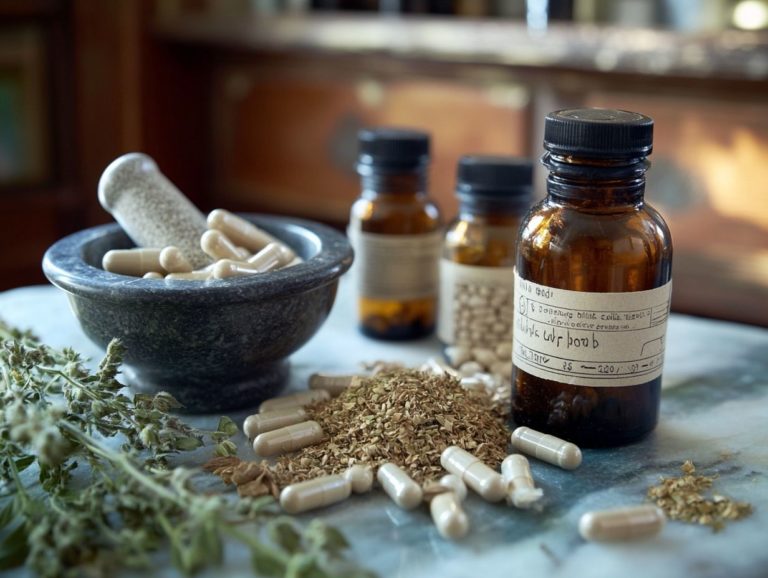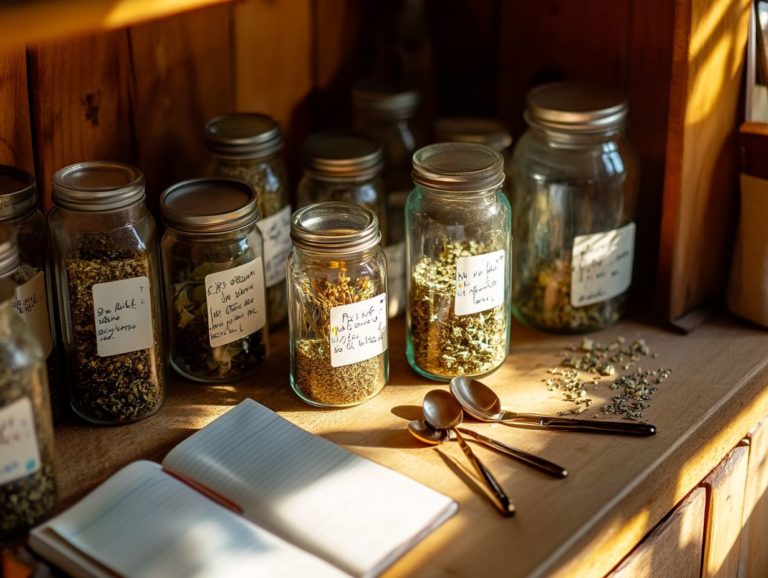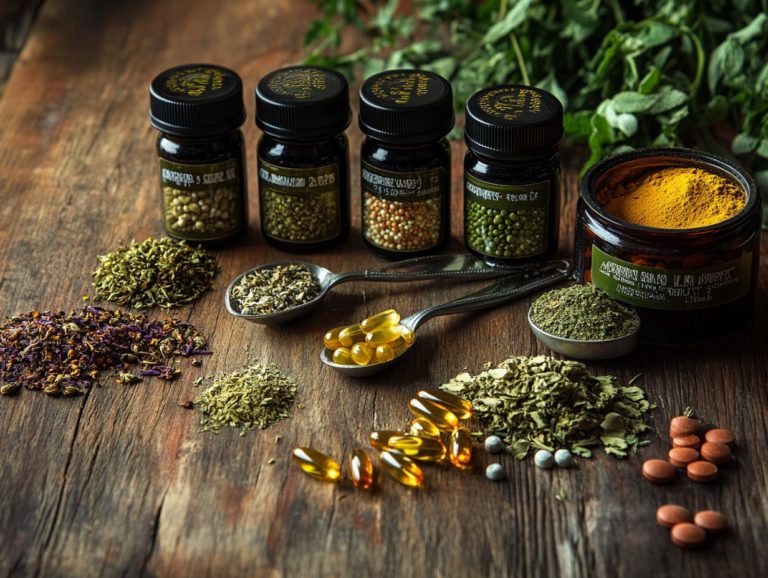Balancing Herbal Remedies: Dosage Guidelines
Herbal remedies have become increasingly popular as natural alternatives for a variety of health concerns. It s essential to grasp how to use them safely and effectively.
This guide will provide you with the fundamentals of herbal medicine, highlighting key factors that can influence dosage, such as age, weight, and specific health conditions.
Explore common herbal remedies, complete with recommended dosages, potential risks associated with improper usage, and strategies for finding the right balance in your approach.
By the end, you ll be well-prepared to make informed choices on your herbal journey.
Contents
- Key Takeaways:
- The Basics of Herbal Remedies
- Factors Affecting Dosage
- Common Herbal Remedies and Recommended Dosages
- Potential Risks of Improper Dosage
- Tips for Balancing Herbal Remedies
- Frequently Asked Questions
- What are herbal remedies and why is dosage important in balancing them?
- How do I determine the correct dosage for a specific herbal remedy?
- Can I adjust the dosage of herbal remedies on my own?
- Are there any general guidelines for dosing herbal remedies?
- What happens if I take too much of an herbal remedy?
- Can I combine multiple herbal remedies together?
Key Takeaways:
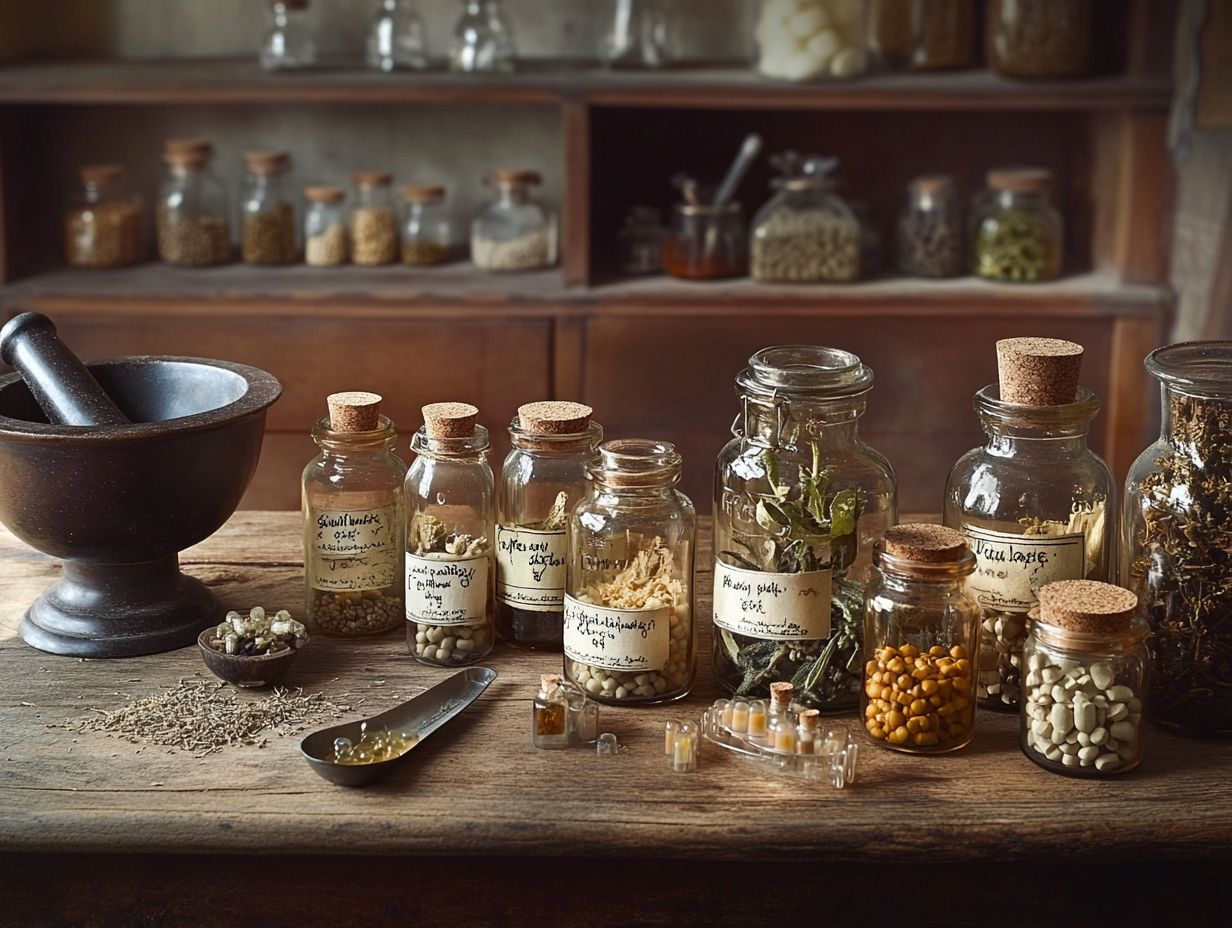
- Know the basics of herbal remedies to find the right dosage!
- Age, weight, and health conditions affect the recommended dosage of herbal remedies.
- Seek professional guidance to balance the use of herbal remedies and minimize risks.
The Basics of Herbal Remedies
Herbal remedies encompass an extensive array of plant-based products, including supplements and extracts. These have been employed for various health conditions throughout history. As part of the broader category known as herbal medicine, they attract individuals seeking natural alternatives to conventional pharmaceuticals.
As you consider herbal remedies for your health and wellness, grasping the foundational aspects of these botanical products is vital. This is especially important regarding their efficacy (effectiveness) and safety.
With the herbal industry on the rise, it s crucial to explore both the benefits and potential risks associated with these products, enabling you to make informed decisions for your well-being.
Understanding Herbal Medicine and Herbal Safety
Understanding herbal medicine means knowing the rules that govern herbal products for health benefits, along with the safety concerns tied to their use. As herbal supplements gain popularity, it s vital to comprehend the claims surrounding these products.
The FDA plays an essential role in evaluating the safety of herbal remedies. It s important to engage with herbal research and education to ensure you’re making informed decisions.
The foundation of herbal medicine is built on centuries of traditional practices, complemented by emerging scientific studies that either validate or challenge these time-honored beliefs. Quality assurance is pivotal, as differences in manufacturing processes can significantly impact the potency and effectiveness of herbal products.
Remain vigilant by seeking out certifications and transparency in sourcing. Consider the credentials of the manufacturers.
By learning to distinguish credible information from mere marketing hype, you can navigate the overwhelming array of herbal claims in today s marketplace. This ensures your choices are not only safe but also beneficial to your well-being.
Factors Affecting Dosage
The effectiveness of herbal remedies hinges on factors that influence dosage, including your individual health conditions, age, and weight. Grasping these elements is crucial for optimizing the benefits of herbal supplements while minimizing potential health risks.
Dosing instructions can vary significantly depending on the specific herbal product and its intended use. Consult healthcare providers for personalized guidance.
By prioritizing education about herbal usage, you can enhance both safety and efficacy, while also addressing common interactions that may impact dosage.
Ready to dive into the world of herbal remedies? Let s explore the essentials!
Age, Weight, and Health Conditions
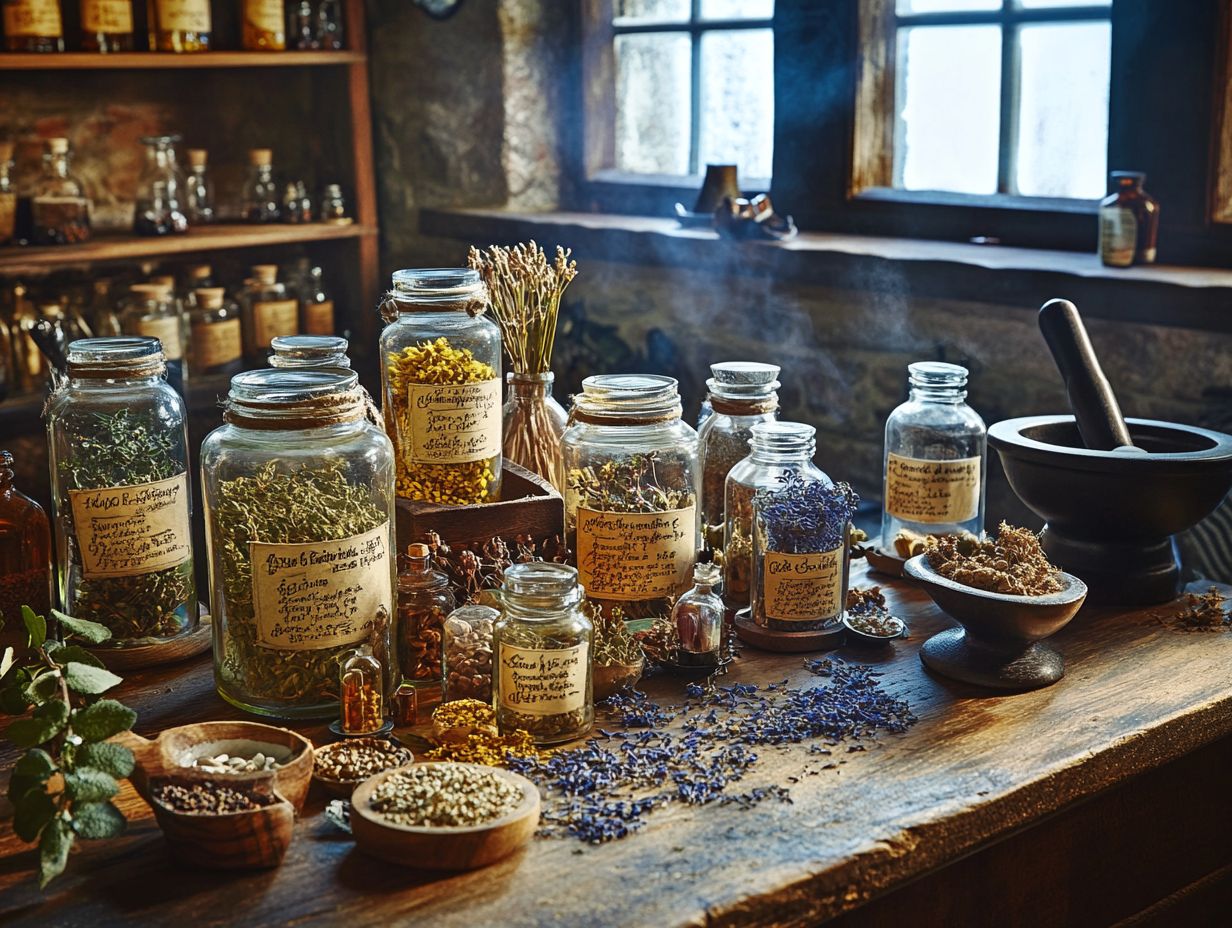
Age, weight, and specific health conditions are crucial in determining the right herbal dosage when seeking herbal remedies. If you’re older, you might need a different dosage than younger adults due to how your body processes food and medicine and potential interactions with conventional medicines.
Your weight affects how your body processes herbs. It’s crucial to understand dosage, especially if you have chronic health conditions.
Underlying health issues, such as liver or kidney disease, can complicate the effectiveness and safety of these remedies. There s no one-size-fits-all approach; personalizing dosages based on your health profile can significantly enhance your outcomes.
By learning about potential herbal interactions with prescribed medications, you empower yourself to take a safer and more informed approach to complementary therapies. Understanding the nuances of herbal use allows you to make better choices that align seamlessly with your overall health strategies.
Common Herbal Remedies and Recommended Dosages
Common herbal remedies like St. John’s wort, Ginkgo biloba, and echinacea each have recommended dosages that vary depending on your individual needs and specific health conditions. It s essential to grasp the efficacy and safety of these herbal extracts if you’re considering adding them to your wellness routine.
While herbal dosage charts can offer helpful guidance, consulting with a healthcare provider is vital to determine the right dosage tailored to your unique health profile.
Herbal Dosage Charts
Herbal dosage charts are invaluable tools that guide you through recommended dosages for various herbal formulations. These charts help you understand appropriate amounts necessary to achieve desired effects while prioritizing safety.
By consulting these dosage guidelines, you can significantly reduce the risk of adverse reactions and enhance your overall experience with herbal remedies.
Developed through meticulous research and time-honored practices, these charts consider factors such as age, weight, and specific health conditions. Each herbal remedy has unique characteristics that affect its efficacy and safety profile, making reliable dosage charts essential.
Follow these guidelines to boost your knowledge of herbal medicine. Responsible use is key to safe healing!
It’s crucial to consult healthcare providers for tailored advice, as individual needs can vary widely. Act now to ensure your herbal products are safe and effective!
Potential Risks of Improper Dosage
Improper dosages of herbal remedies can pose significant risks, including adverse reactions and harmful interactions that may jeopardize your health, especially when self-medicating.
While many view herbal supplements as safe alternatives to conventional medicines, incorrect dosing can lead to side effects ranging from mild annoyances to serious complications. Recognizing these risks highlights the necessity of adhering to established guidelines.
This ensures your use of herbal products remains both safe and effective!
Side Effects and Interactions
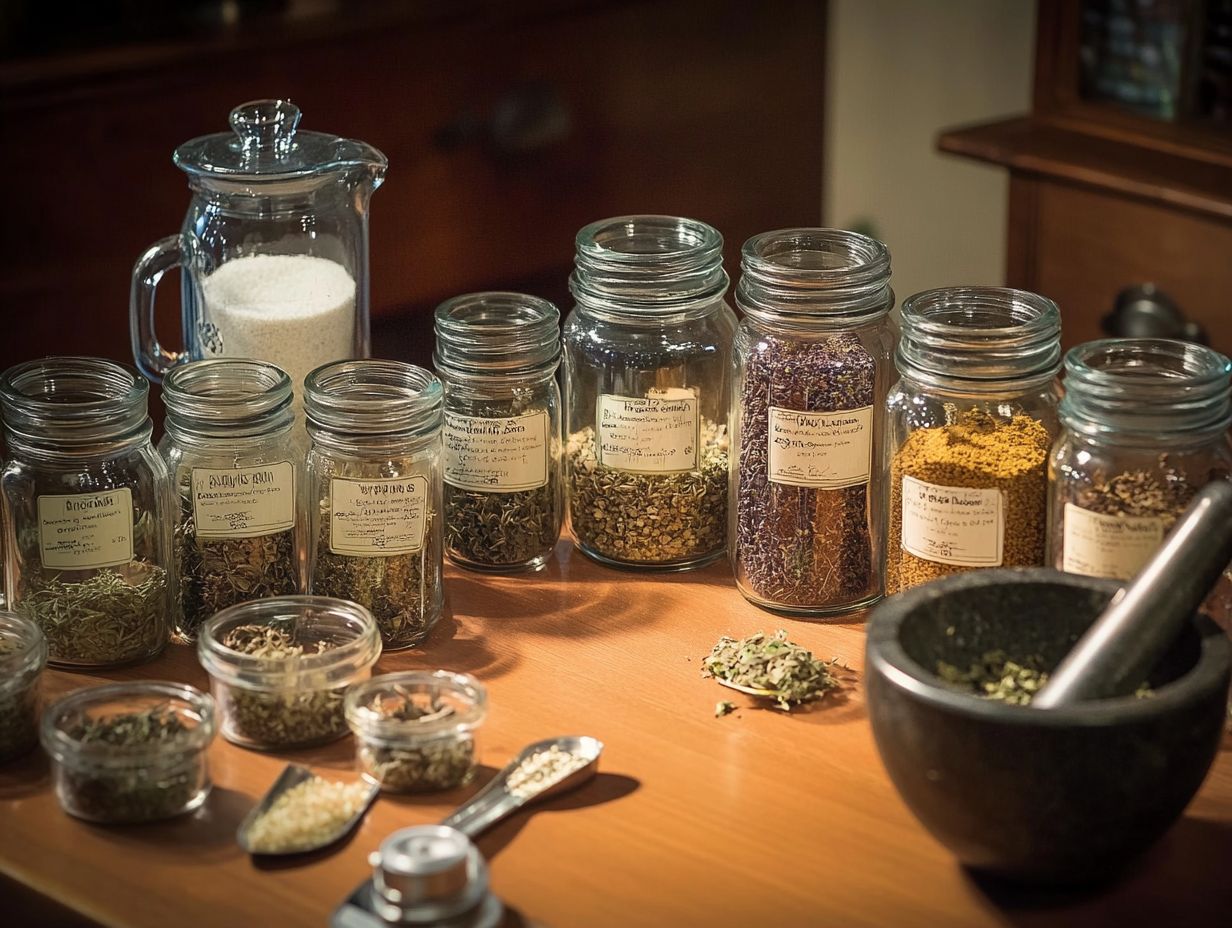
Side effects and interactions between herbs and medications are crucial factors to consider when using herbal remedies, as they can significantly influence your health outcomes. By understanding the potential adverse reactions associated with common supplements like garlic or ginseng, you empower yourself to make informed decisions about your well-being.
It’s important to talk openly with your healthcare provider to enhance safety, ensuring that you receive effective monitoring and management of any interactions. The very supplements celebrated for their benefits can also trigger unwanted effects, such as stomach problems or allergic reactions. Some herbal products may interfere with conventional medications, impacting their effectiveness. For example, St. John’s wort is notorious for reducing the efficacy of certain antidepressants and birth control pills, highlighting the necessity for careful oversight.
It’s important to be proactive. Seek guidance from healthcare professionals who can offer tailored advice specific to your needs. By staying well-informed and maintaining open lines of communication, you can mitigate risks and ensure that your approach to health is both safe and effective.
Tips for Balancing Herbal Remedies
Balancing herbal remedies with conventional medicines or other treatments demands thoughtful consideration and, frequently, expert guidance. To truly harness the benefits of herbal supplements while mitigating potential risks, you can adopt specific strategies:
- Diligently monitor your dosages.
- Familiarize yourself with the distinct properties of each herbal product.
- Engage with qualified herbalists or healthcare providers for invaluable insights into best practices.
This collaborative approach supports effective herbal education, enabling you to navigate your wellness journey with confidence.
Seeking Professional Guidance
Consulting professional guidance, particularly from qualified herbalists or healthcare providers, is essential for making well-informed decisions regarding your use of herbal remedies and dietary supplements. By consulting with healthcare providers or qualified herbalists, you can gain valuable insights into the intricacies of herbal medicine, including how much to take, potential interactions, and necessary safety monitoring. This expert involvement not only boosts your confidence but also maximizes the potential benefits of incorporating herbal treatments into your comprehensive health plan.
Professionals are well-equipped to offer tailored recommendations based on your unique health conditions and dietary needs, significantly enhancing the therapeutic effects of herbal remedies. They play a vital role in helping you identify reputable sources and verifying the purity of the products you choose. For those new to herbal treatments, understanding dosage is crucial; consider checking out herbal preparations dosage tips for beginners. By openly discussing any concerns about potential side effects or situations where herbal remedies might not be safe, you can feel more secure in your decisions.
Ultimately, this expert involvement not only boosts your confidence but also maximizes the potential benefits of incorporating herbal treatments into your comprehensive health plan.
Monitoring and Adjusting Dosages
Monitoring and adjusting dosages of herbal remedies is essential for you to pursue optimal health outcomes and ensure safety in their use. This ongoing process not only confirms the effectiveness of the remedies but also protects you from potential risks that could cause adverse reactions if not properly monitored.
By keeping a detailed record of any changes in your symptoms or overall well-being, you equip your doctor or herbalist with invaluable information. This collaborative approach enables practitioners to adjust dosages based on your needs while remaining vigilant about any interactions with prescribed medications. For more insights, consider exploring understanding herbal extraction methods and dosages.
Regular consultations help practitioners share insights on the most suitable herbal options for your specific health challenges, emphasizing the need for a well-informed and cautious approach to herbal treatment.
Frequently Asked Questions
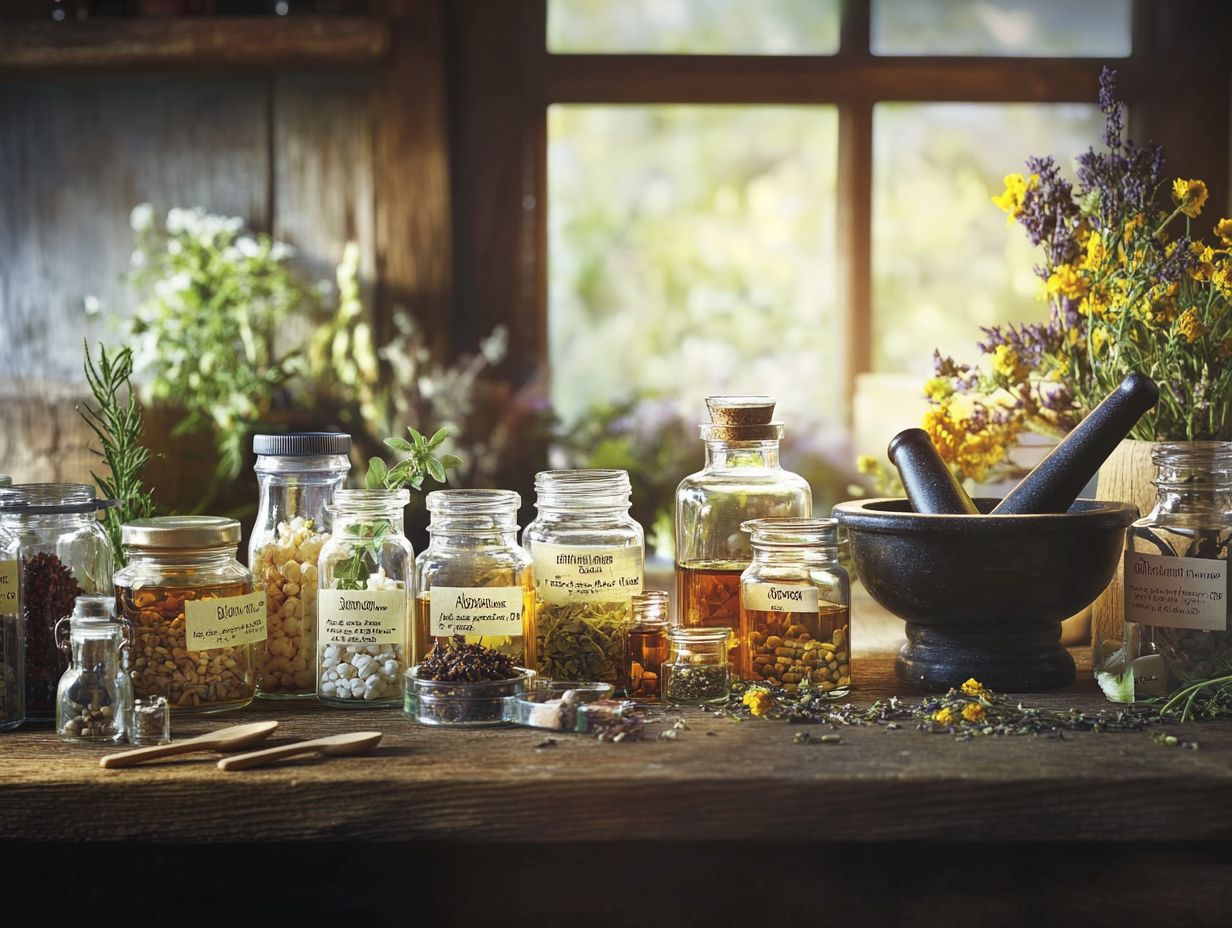
What are herbal remedies and why is dosage important in balancing them?
Herbal remedies are natural substances derived from plants that are used to promote health and healing. Dosage is important in balancing herbal remedies because it ensures that the therapeutic effects are achieved without any harmful side effects.
How do I determine the correct dosage for a specific herbal remedy?
The correct dosage for a specific herbal remedy depends on various factors such as age, weight, and overall health. It is always best to consult with a qualified herbalist or healthcare professional for personalized dosage recommendations.
Can I adjust the dosage of herbal remedies on my own?
No, it is not recommended to adjust the dosage of herbal remedies on your own. Herbal remedies can be potent, and even small changes in dosage can have a significant impact on their efficacy and safety. It is important to always seek professional guidance when it comes to herbal remedies.
Are there any general guidelines for dosing herbal remedies?
Yes, there are some general guidelines for dosing herbal remedies. It is recommended to start with a low dose and gradually increase if needed. Also, it is important to follow the recommended dosage on the product label or as advised by a professional.
What happens if I take too much of an herbal remedy?
Taking too much of an herbal remedy can lead to potential side effects such as stomach upset, headaches, and allergic reactions. In some cases, it can also interact with other medications or supplements. It is important to always stick to the recommended dosage to avoid any adverse reactions.
Can I combine multiple herbal remedies together?
Yes, you can combine multiple herbal remedies together. However, it is important to consult with a professional to ensure that the combination is safe and effective. Some herbs may interact with each other, and it is crucial to know the right dosages and potential interactions before combining them.

